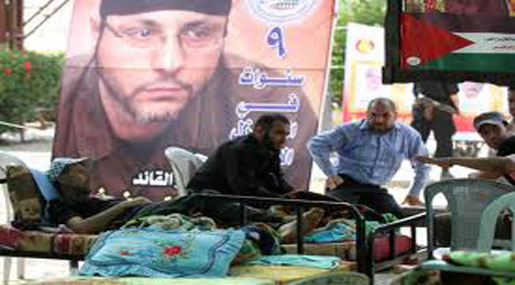
Jordanian Prisoners Alone in Hunger Strike amidst Official, Popular Negligence

Mirvat Sadeq - Ramallah
56 days ago, the Jordanian prisoner from Palestinian origins Abdullah al-Barghouti declared hunger strike. Although his medical condition deteriorated and was subsequently transferred to the hospital, he still insists on the strike until his and four other prisoners' demands are achieved.
Their demands included being released to Jordan and their families being allowed to visit them.
On this note, inmate al-Barghouti's wife had said that his family does not know anything about him ever since he declared hunger strike except what his lawyer and the Red Cross tell them. His wife, during the 11 years her husband was imprisoned in, was only allowed to visit him twice!
Al-Barghouti is 40 years old and currently being treated in al-Oufoula hospital from hepatatrophia, in which his health condition deteriorates day after day with no progress whatsoever.
Moreover, al-Barghouti's sentence is considered the highest the "Israeli" authorities ever issued, which reached 67 life sentences.
He was arrested back in 2002 on charges of being involved in a self-sacrifice operation which killed 67 "Israeli" soldiers. Al-Barghouti holds the Jordanian citizenship and is a father of three.
Al-Barghouti is considered one of the five prisoners who hold Jordanian nationalities and are detained in Zionist prisons over several charges. In a letter, these inmates mentioned their open hunger strike would continue until their demands are achieved.
They summed up their demands in being transferred to Jordanian prisons, spending the rest of their sentences there based on the Wadi Araba Treaty between Jordan and "Israel", exhuming martyrs from the Numbers Tombs, and revealing the missed people's fates.
Moreover, a Mohammad al-Rimawi inmate resembles the case of al-Barghouti in terms of his family not knowing anything about him, as his wife said, except what this lawyer tell them about his deteriorating health condition.
"We know nothing except what the lawyer tells us since he visits him once in a while and consistently reassures us that he's okay. We were forbidden from visiting him more than two months ago since he declared his hunger strike," al-Rimawi's wife said.
Forbidden from visits
Mohammad Fahmi Ibrahim al-Rimawi, 46, is one of the Jordanian prisoners on hunger strike since 20 days, protesting against their continuous arrests in "Israeli" prisons. The Jordanian King and government also demanded to intervene and release them.
Al-Rimawi faces a life sentence after being convicted of participating in the assassination of the former "Israeli" Tourism Minister Rehavam Ze'evi in October 2001.
According to his wife, al-Rimawi's family (parents and siblings) are in Jordan, and had applied for a permit to enter the country back in the 90s, and stayed in the West Bank in Beit Rima west of Ramallah where his in-laws are until he was arrested in 2001.
The family doesn't quite know his medical condition exactly, in which his wife reiterated that he suffered a stomach illness before due to medications the "Israeli" Prison Service offered him. Al-Rimawi's lawyer accentuated his deteriorating medical condition, where he suffered severe lung infection.

In addition, the "Israeli" authorities had forbidden Mohammad al-Rimawi's family to visit him, his wife saying in this regards, "They only allowed his children to visit the first time, and after five years they allowed me to visit."
Jordan's responsibility
The specialized researcher in prisoner affairs Fouad al-Khafash said that prisoners entered their fifth week of strikes, which places them in a dangerous phase because some of them suffer difficult diseases.
In an interview with al-Ahed News website, al-Khafash went on, "There is no special survey for Jordanian prisoners, and figures vary from 21 to 27 prisoners, all of which are from Palestinian origins with Jordanian social security numbers. Their families resided in Jordan ever since the Nakba Day in 1948 and the 1967 war."
Furthermore, al-Khafash remarked that five of the prisoners are on hunger strike to improve their living conditions in prison, and demanded to be supported by the Jordanian ambassador in the West Bank, and their families to be able to visit them in Jordan; a matter that "Israeli" authorities prohibited years ago.
Al-Khafash further added that the Wadi Araba Treaty between Jordan and "Israel" stipulates their release, especially that they are excluded from any exchange agreements between Palestinians and the "Israelis".
He doubted the official Jordanian stance that supports the strike movement, saying that any strike needs two points to be successful: the prisoners' determination which is witnessed through the news from prisons, and the popular and official support.
The second factor, according to al-Khafash, doesn't exist, since there is no intervention on the official Jordanian side who could've solved the predicament in a matter of minutes. The Jordanian authorities persist in not holding responsibility, especially that they are indicted with charges concerning the Palestinian cause.
On this note, al-Khafash expected reaching a middle solution to this case, in order for the inmates to be able to be visited by their families in return for calling off their strikes.
Source: al-Ahed News, translated by website team



